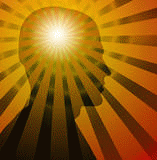|
Lewis Mehl-Madrona: NIMH and its Biologic Emphasis
I respond to Dr. Thomas Insel's blog about his views of the top ten advances for mental health for 2012. What saddens me is that all of these advances are heavily biological and that biological medicine hasn't really succeeded very well in improving our mental health. While these advances are very interesting, I argue that what we need is more understanding of how our social relationships form our brains and behavior. 1 |
Lewis Mehl-Madrona: Problem Based Learning
Problem-based learning has become the norm for much of medical education, yet other disciplines are slower to adopt it. I muse about how to integrate PBL (as if is called) into the on-line psychology teaching environment and consider student objections. This essay was prompted by the comments of two students who were strongly opposed to PBL and gave me the opportunity to reflect upon its strengths and weaknesses. |
Lincoln Stoller: Sorcery For Scientists An exhortation to expand your understanding beyond the bounds of reason. 1 |
 Vijayaraghavan Padmanabhan: When Consciousness Becomes The Basis Of Structure Since the structure-consciousness link can work the other way round, one can postulate that changes in consciousness can produce modifications in the gene structure. 2 |
Lewis Mehl-Madrona: Narrative and Science: Day 13 of the Australian Journey
Today was our last full day in Australia and the occasion for a lecture and series of discussions at the University of Melbourne's Center for International Mental Health and School of Population Health. We explored the bridges between science and the indigenous world view of narrative. Particularly we were impressed with how neuroscience is completely supporting indigenous knowledge about narrative and its importance! |
Lewis Mehl-Madrona: Why Learn Neuroscience?
A student asked me why she needed to know neuroscience. Here is my answer. I argue that science is the new story with which we must contend. If we do not know the contemporary stories of science, they will be used against us. The actual stories being told today about the brain are quite uplifting, full of hope. They include neuroplasticity and epigenetics. If we know these stories we can fight against bad neuroscience. 1 |
|
Lewis Mehl-Madrona: Explanatory Plurarlism
I ask the question, what if all knowledge existed in the form of stories and all stories were true? If we practiced in this manner, as advocated by Uncle Albert, an aboriginal elder, how would we act? The notion of explanatory pleuralism argues that explanatory stories on any particular level do not have to relate to any other level of explanation; rather they must correspond to the level of which they are explaining. |
Dr. Kathleen Albertson, L. Ac., PhD: The 5 Myths of Acupuncture: Do you Know them?
Does acupuncture hurt? Do I need to continue treatment forever? Is ther physiological change in the body?
This article dispels some of your questions and puts to rests the myths surrounding this 5000-year-old holistic health science. Yes, acupuncture has been in existence for 5000 years; compared to western medicine that is just over 200 years old.
It has stood the test of time. |
Judith Acosta: PRIMUN NON NOCERE: First Do No Harm Primun non nocere. This is still the sacred promise of every medical school graduate across the country as he or she accepts the diploma, the title and the rank of healer in our culture. It is the core of the Hippocratic Oath. However, in a world of unreasonable speed, in which new discoveries and new pharmaceuticals are being produced in measures of seconds, not years, it may be more than doctors can promise us anymore. |

|
Articles For Tag "Science" |
